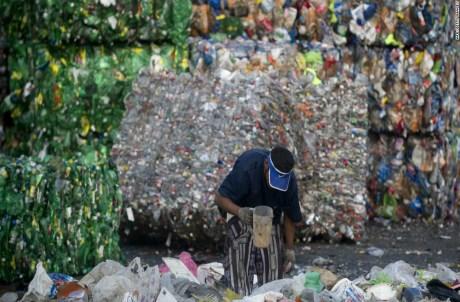
4 minute read
RU Refilling? By Brayden Donnelly

R U R e f i l l i n g ?
by Brayden Donnelly
Rutgers University is renowned for its rich scarlet red, years of tradition, and influence on the Garden State. The University was born in a time when the word plastic had yet to be mentioned. Now, each staff member, student, and local resident finds themselves in contact with the substance and its many forms. Joining together the knowledge and awareness provided by this university, its staff, and diverse student body, we will be able to move towards a holistic understanding of how to best orchestrate the creation, use, and disposal of these plastics. The NJDEP has 854 registered dumpsites in New Jersey as of December 2014. Most of these sites find themselves full of disposable water bottles. In 2012, the NJDEP recorded that New Brunswick alone produced 572.49 tons of waste classified as “plastic containers”, and 183 additional tons of “other plastics”. The community needs to be aware of the huge burden throwaway plastics put on the waste stream and infrastructures. With all of the conveniences and progressive solutions they are associated with aside, do a great deal of damage to the planet. The Rutgers University and New Brunswick communities must not be alarmed or scared off by these numbers. Each individual has the opportunity to make a difference. That opportunity will start with the individual’s first step:

Each individual must start small, but think quickly. Each individual must start quick, but think simply. Each Individual must start simple, but think globally.
This could very well be the new mantra of the environmentally-conscious within the New Brunswick area. With this moral in the back of everyone’s minds, these issues can be lessened, and eventually solved. As if hearing the echo of the call for less plastic waste, Rutgers has made a few modifications to the student centers, libraries, and fitness centers over the past few years. The newest additions to the scarlet family are Elkay EZ H20 Cooler Kits; also known as water refill stations. They were brought to campus in part by the New Jersey Public Interest Research Group (NJPIRG), Take Back the Tap, Green Purchasing, and student funding. Their job is to help each of us see the simplicity in lessening the weight of plastic bottles on our municipalities. According to Elkay’s website, these refill stations come in at around $1,500 – $2,500 depending on various aesthetic and filter options. Their return on investment has already been greatly surpassed considering many of the stations around campus have registered numbers in the realm of 50,000 to 100,000+ refills since their installments. Averaged out, most disposable water bottles cost around a $1.00. This means that Rutgers has saved the community hundreds of thousands of dollars with a mere $2,000 investment in each refill station. On top of these numbers, Rutgers has helped keep hundreds of thousands of disposable water bottles out of the waste stream. This number can only keep growing. You can be a part of it with only a small investment of $4.00 to $7.00 in a reusable water bottle. Imagine how great it will feel to take this first small step towards a greener planet. For the individual, that $4.00 to $7.00 investment in a reusable water bottle will save you hundreds of dollars each year. The savings come from what you may have spent instead on bottled water. For the homeowner a gallon of bottled water costs roughly $8.00 while a gallon of tap water, within their own homes, costs ¢1. Daily Finance, a website for the economically and environmentally concerned, helps to lay out each of these number comparisons on their website. Many feel that no matter the benefits, bottled water is the cleaner, healthier, and safer route to choose. In recent years this idea has been debunked. Organizations such as the Food and Drug Administration (FDA), the Environmental Protection Agency (EPA), and the Center for Disease Control (CDC) have pointed out the fact that tap water and bottled water are tested very differently, according to the EPA. Tap water falls under the regulations of the Federal EPA. Often, they will test major water sources every few hours. On the other hand, the Food and Drug Act is responsible for regulating bottled water. This is due to the fact that bottled water is considered a food as well as a private industry. They check bottling plants only a few times a year. Neither the EPA nor the FDA actually certifies bottled water companies. Switching from disposable to refillable water bottles will change the university, and the surrounding area, in multiple ways. The shift in habit from disposable to reusable will provide an economic savings, as well as a mental “pat on the back” for the individual. So, please, start reusing, recycling, and most importantly refilling here at Rutgers University.
Sources:
- http://www.epa.gov/safewater/faq/pdfs/fs_healthseries_bottlewater.pdf - http://www.elkay.com/bottle-filling-stations - http://www.cbc.ca/news/health/bottle-vs-tap-7-things-to-know-about-drinking-water-1.2774182 - http://www.nj.gov/dep/dshw/recycling/stat_links/2012finalreport.pdf - http://www.nj.gov/dep/dshw/lrm/landfill.htm - http://www.cdc.gov/healthywater/drinking/bottled/index.html - http://www.dailyfinance.com/2011/03/08/savings-experiment-break-your-bottled-water-habit-and-save-on-h/ - https://www.facebook.com/rutapped - “Bottled Water: Not a Smart Choice” – Weaning Rutgers University Off the Bottle With the Installation and Awareness of Water Fill Stations










